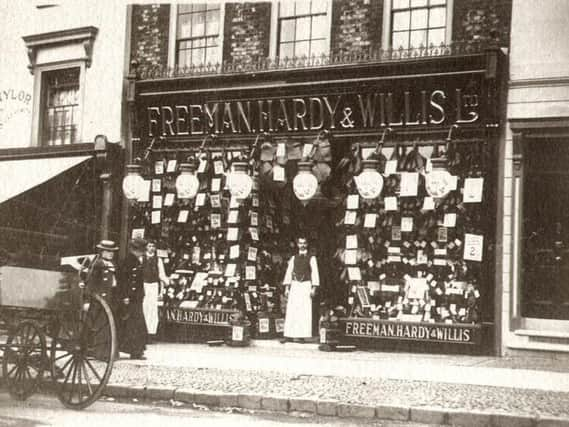Gaywalls shop, crashed German bombers and the 'salt of the earth' people who kept Rugby going


Just before writing this piece, I did a quick check on the internet to see whether this Rugby shop still existed in any shape or form.
It’s surprising – or not, as the case may be – what turns up when you type ‘Gaywalls’ into a search engine.
Advertisement
Hide AdAdvertisement
Hide AdBut that’s the English language for you. Some words can change their meaning overnight, something perhaps worth bearing in mind when you about to start up a company or organisation.
Not that paint shop owner the late George Denny should have worried, though.
He’d long passed away when the mere mention of the name ‘Gaywalls’ might have caused a snigger or a smirk.
Many Rugby people will recall his little shop tucked away behind The Squirrel pub in Gas Street. Even the rainbow design on the frontage means something else these days, so it just goes to show that you can’t count on the vagaries of the Mother Tongue.
Advertisement
Hide AdAdvertisement
Hide AdProprietor George Denny was a good friend of my father’s. They met while serving in the Auxiliary Fire Service (AFS) during the Second World War.
Men turned down for military service tended to end up in the AFS.
Cynics often maintained the acronym stood for ‘avoiding foreign service,’ but that was before the appalling death toll suffered by firemen on the night of the 500-bomber raid on Coventry on November 14, 1940.
If nothing else, the events of that terrible night proved that being a fireman in blitzed and battered Britain was far from being a cushy number.
Advertisement
Hide AdAdvertisement
Hide AdAnyway, my father and George became good mates, the friendship enduring into the post-war years.
Back in the 1950s and 60s, Gaywalls was the place to go if you wanted a pot of paint, set of brushes, thinners or wallpaper.
You’d go in the shop and George would be stood behind the counter, wearing his tan-coloured ‘duster’, and with a ready smile that said ‘welcome.’
In those days, Gaywalls was typical of the small British shop, destined to be driven off the face of the Earth by the big conglomerates that would go on to dominate British shopping habits in the decades that followed.
Advertisement
Hide AdAdvertisement
Hide AdWe are unlikely to ever see their like again. And George’s death in the 1980s heralded the end of yet another era for Rugbeians.
However, the Denny family would remain well known in the town as son Michael Denny was for many years president of the Old Laurentian Association, made up of former members of Lawrence Sheriff School.
Michael was a pupil at the school during the 1950s and was, by all accounts, a very popular lad and all-round sportsman.
He went to university around 1959, which is probably why he didn’t join our families’ two-week holiday to the East Coast that year.
Advertisement
Hide AdAdvertisement
Hide AdOn several occasions during that bracing time spent near Skegness, sheltering behind the vitally necessary windbreaks, I recall my father and George reminiscing about their days together in the fire service.
One anecdote concerned a German bomber that had been downed by our fighters, crashing on the Burton Dassett Hills near Kineton.
A fellow fireman nicknamed ‘Wam,’ on account of his initials, attempted to break open the pilot’s door with an axe.
Unfortunately for ‘Wam’, the axe glanced off the metalwork, cutting deeply into his leg. Poor ‘Wam’ took one look at the injury… and immediately fainted.
Advertisement
Hide AdAdvertisement
Hide AdI wonder if any of ‘Wam’s’ relatives are still living in the Rugby area and might recognise this tale of wartime woe?
Another story concerning ‘Wam’ relates how a beer barrel had sprung a leak during a pub blaze. Ever the opportunist, ‘Wam’ lay down on his back, and opened his mouth to catch the cascading amber nectar.
Unsurprisingly, ‘Wam’ was soon intoxicated, and had to be carried back semi-conscious to the station in Chapel Street by his mates.
I have no idea whether ‘Wam’ was ever disciplined over his numerous escapades. The feeling I get is that there was many a ‘blind eye’ turned in his direction, which in less forgiving times might not have been the case.
Advertisement
Hide AdAdvertisement
Hide AdI doubt very much whether there will be any surviving former members of Rugby AFS still around. These men may not have fought in foreign fields, but they served all the same, a number being killed as the German Blitzkrieg was unleashed on our towns and cities.
Michael Denny died a few years ago, and with his passing, yet another pillar of the Rugby community was lost. To the best of my knowledge, his sister Rosemary is still around.
But thankfully, these characters will live on in the memories of all those who knew them.
They may not have been famous for being famous like so many so-called ‘celebrities’ today, but they were truly the salt of the earth, the people who sustained the town of Rugby throughout the days of both war and peace.
John Phillpott’s third book titled Go and Make the Tea, Boy! published by Brewin Books, is now on sale.